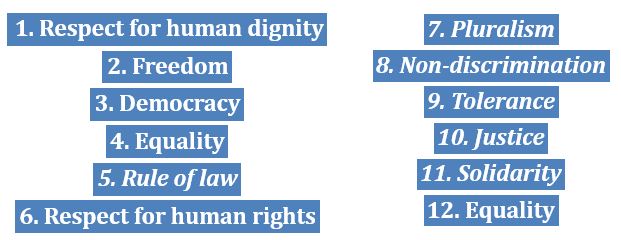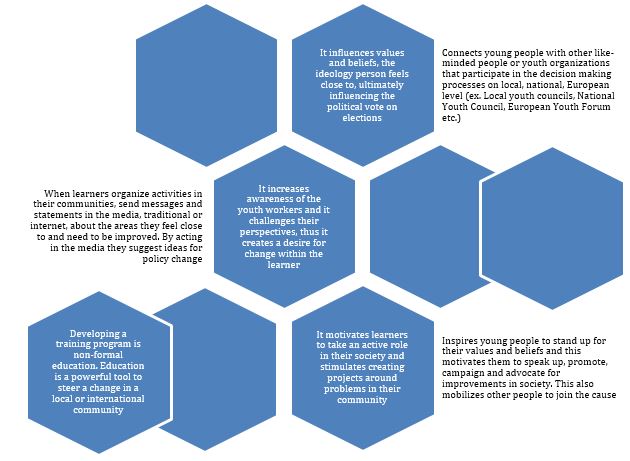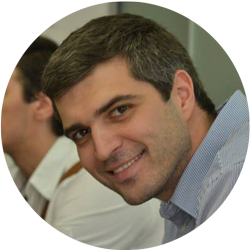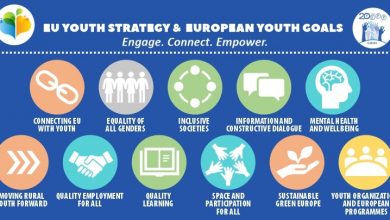Trainers work as a civic engagement doing
The trainer’s role in shaping young people’s political perspectives is one of the most important roles the trainers have in developing a democratic society based on European values. We can see two dimensions of the ‘political dimension of the trainer’s work’. First, the youth sector itself represented by NGOs, and second, the trainer as an individual. The role of the NGOs in policymaking is on the same level as politicians from a political party. NGOs mobilize people around a certain cause and they safeguard the values/cause upon the NGO is formed. Any kind of activity which involves promotion on social media, campaigning, advocacy, lobbying or policymaking is a political act, aiming to send a certain message. As an individual trainer, you engage yourself in the facilitation of workshops and training that influence the opinions and perceptions of the participants. Influencing a young person's perceptions and ideas is in due course influencing his personal values (consciously or subconsciously). Ultimately, your training might influence his decision on the day of the (political) elections or will motivate him to act in his local or international community. These processes are political, in its core, and this tool explores them more in detail below. Understanding and accepting your role as a civic engagement doing is one of the first steps for creating a change. Read it carefully and think deeply.

- NGOs as political subjects
NGOs are legal entities, composed of a group of people that have a certain ideology, which is based on values and principles. Besides, in raising awareness and education, NGOs have a crucial role in campaigning, advocacy, lobbying, and policymaking.
Policymaking includes work with institutions and authorities (decision-makers). NGOs propose policies and measures for improvement of the lives of the citizens they are representing and use campaigning, advocating and lobbying to make the public institutions adopt and implement the proposed measures and policies; NGOs can propose policies and initiatives that can change laws, strategies, action plans, and budgets. Their role is to engage in regular dialogue with public authorities to ensure better implementation of initiatives and policies. They promote social or political change on a broad scale or very locally. With these processes NGOs influence opinions among young people and citizens, thus ultimately influence the political vote on elections.
NGO’s ideology is based on certain values and principles, it’s close to a certain political party’s ideology, for example, the liberals, greens, socialists, democrats, etc. But there is a big difference between the role and the aim of a political party and the role of an NGO.
Political parties are aiming to come to power and govern the state, promising to ensure better lives of the people, and they do it through policies and measures which are close to their ideology.
It is said that NGOs ‘ role is to be the “conscience” of the society. NGOs’ goal is not to come to power, but to act as a constructive corrective force to the Government and public institutions, and safeguards the public values and principles, the humanistic, and the European values.
The values of the European Union enshrined in the Treaty of the European Union are:

2. Trainer’s work as a civic engagement doing
Being civically engaged in the context of the European Training Strategy is about addressing the transformative role of trainers at empowering young people and the empowerment of people working with youth to take an active role in their society. Taking an active role means being aware of the challenges in your local or international community. It means making or influencing a positive change in line with the humanistic, European values.
Trainers’ role in the empowerment of young people in this direction is crucial. Using different learning methods, tools, and resources, trainers find themselves in a critical role to influence young people’s opinion, their perceptions, and values. By doing this, trainers find themselves in the role of activists; speaking from the perspective of values (ex. human rights) close to their beliefs. Therefore, first and foremost, the awareness, self-directed learning, and the continuous personal development of the trainer are of essential importance, to make sure that the influence is in line with humanistic and European values.
Besides influencing the perceptions and values of the learners, one of the roles of a trainer is to inspire and facilitate a process for the young people to organize actions and initiatives aiming to make a difference in and for their local or international community. It is also about helping them to understand their rights in a democratic society and the tools available for making a real-life and practical change in their community. It is also about introducing them with the institutions that represent young people and make a decision “for” them, or in their name.
Trainers work is a civic engagement work because of several reasons:

The role of a trainer in inspiring civic engagement and positive change in society is crucial and it is important that one understands and develops the ways it can make it happen. Understanding and using these tools in this competence area are important for increasing your civic engagement. Besides accepting your role as a civic engagement activity, the other indicators such as Knowledge of relevant policies and programs; Knowledge of different independent sources of information; Skill to relate policies to own values and beliefs; Skill to consider different political perspectives; are crucial for developing this competence.
Why did I choose this tool?
This tool is informative and it gives a better insight into the NGO’s work and the role of the trainer in the civic engagement area.
Suggested Reflection Questions
Do I see myself as a political being? Why?
What is the one issue that bothers you very much?
When is the last time you have participated in a campaigning/advocacy activity for a certain issue? How was it? What did you learn? What was your role?
What is my role as a trainer to inspire young people to engage in democratic processes in society and contribute to a practical change?
How do you understand the policymaking process?
What is the difference between politics and policies? What is the difference between party politics and NGO politics?
Have I participated in a process of policy creation?
Other Ways to Practice
Please discuss the questions and inputs further with other learners and youth workers. The open questions and the food for thought that is inside this tool are a good basis for a discussion or a workshop with other learners and youth workers.
Exercises
– Think about how you can translate a value into policy. Example, what kind of policies can you propose if you care about equality?
– Take for example the European Green Deal as an official EU policy. What kind of training program can you develop in order to support the implementation of the EU Green Deal?
– Imagine you are organizing a training. How can you ensure equal access to decision making for all participants in the preparation of the training?
– What is the one thing that you see as a problem in your local community? What actions can you take as a trainer to address this problem to the relevant institutions?





